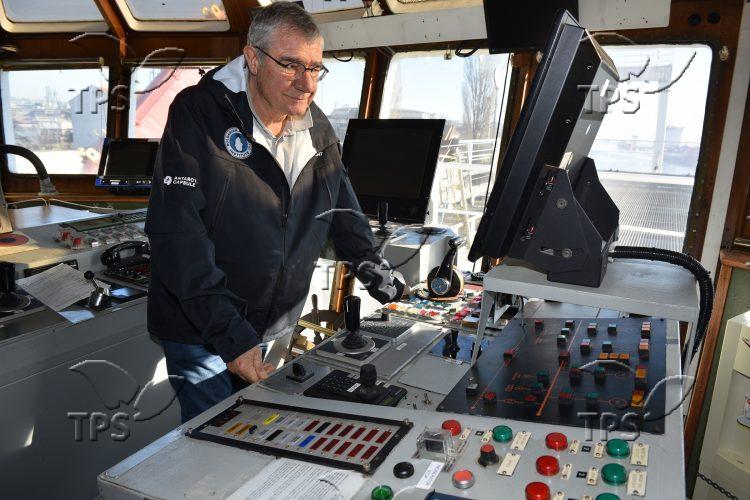Bulgaria Has Had Firm Foothold in Antarctica for 35 Years
Jerusalem, 21 December, 2022 (TPS) -- SOFIA, 21.12.2022 (BTA)
On December 27, the Bulgarian military research/survey vessel (RSV) Sv. Sv. Kitril i Metodii is expected to sail off from the Black Sea city of Varna for Antarctica. This is the first time a Bulgarian research vessel will reach Livingston Island where it will stay for about a month. This is the 31st Bulgarian Antarctic expedition, which proves that “the Bulgarians have a firm foothold оn the Ice Continent”, according to the expedition leader, Prof. Christo Pimpirev.
BTA’s journalist Konstantin Karagyozov will be aboard the ship and will be reporting from Antarctica. His reports will feature on BTA’s website in a section entitled “Bulgaria – Antarctica: BTA’s Log”.
Prof. Pimpirev told BTA: “The 31st Bulgarian Antarctic expedition has already started. The first group of 11 people has started serious research. The Bulgarian base is fully functional, it has not sustained any damage during the severe polar winter. This expedition is notable for being the first one in which a military research/survey vessel will reach Antarctica. This proves that Bulgaria is a seafaring nation and is not locked in an inland sea. I am particularly proud that this Bulgarian ship, the Spanish vessels and those of the other friendly countries make up a flotilla – an Antarctic flotilla of peace and science.”
The first group of the 31st expedition reached Bulgaria’s St Kliment Ohridski Polar Base on December 8 after a 10-hour passage from King George Island aboard the Chilean ATF Galvarino. The group started de-winterizing the base in anticipation of the RSV Sv. Sv. Kiril i Metodii.
Bulgaria first set foot on the Ice Continent on February 3, 1967, when meteorologist Tsoncho Chapanov took part in a Soviet expedition. Twenty years later, the first Bulgarian Antarctic expedition took place as Associate Professor Borislav Kamenov and Assistant Professor (now Professor) Christo Pimpirev joined a program of the British Antarctic Survey, and four Bulgarian scientists worked with the Soviet expedition.
The first Bulgarian “house” on Livingston Island was delivered at that time, which laid the foundations of the polar base. The six scientists lived in a single container home, which served as a bedroom, living room, dining room and study. It was dubbed “the Lame Dog” because one of the later expeditions found it bouncing in the wind on damaged props. Over time, the Lame Dog became a symbol of Bulgarian research on Livingston Island. Now it is a museum which doubles as Bulgaria 1090, the country’s first and most remote post office abroad.
In 1993, the buildings were renovated, and in 1996-1998 a new multifunctional building was erected. In 2003, the St John of Rila Chapel was built. A new chapel built in 2012 became the first Orthodox place of worship in Antarctica. Two new buildings containing bedrooms, a medical office and two laboratories (for geologists and biologists) were added in 2008-2009.
Between 1993 and 2022, the Bulgarian Antarctic Institute (BAI) organized and conducted 30 expeditions, involving research in geology, biology, glaciology, meteorology, medicine, topography and geography. Some of the geological research projects focused on the stratigraphy, petrology and tectonic-magmatic history of the South Shetlands Archipelago, of which Livingston Island is part. Biological research includes studies of the Antarctic terrestrial ecosystems and environmental monitoring based on heavy metal content in lichens and penguin feathers. The composition of rocks around the Bulgarian base, the flora and fauna of the site and the human impact on nature are also studied.
Multinational research projects have also been carried out, such as PERMANTAR, a three-year collaboration between Bulgaria, Spain and Portugal, which focused on permafrost and involved drilling to a depth of over 20 meters.
The Bulgarian Antarctic Institute collaborates with the Antarctic programs of Spain, Britain, Russia, Germany, Argentina, Brazil, Chile, South Korea, etc. BAI is a member of COMNAP (Council of Managers of National Antarctic Programs), SCALOP (Standing Committee on Antarctic Logistics and Operations), EPB (European Polar Board) and SCAR (Scientific Committee on Antarctic Research).
Bulgaria joined the Antarctic countries in 1978 when it signed the Antarctic Treaty with no right to vote. In 1998, Bulgaria became a full member with the right to veto on all matters concerning the future of Antarctica alongside the great powers. Membership of the governing body is important on account of the continent’s huge natural resources, although there is a moratorium on their use until 2040.
BAI Chairman Christo Pimpirev said the future benefits for Bulgaria will be enormous because the world needs increasingly more resources. He recalled that the Bulgarian expeditions had found copper, gold, silver and many other metals on Livingston Island.


